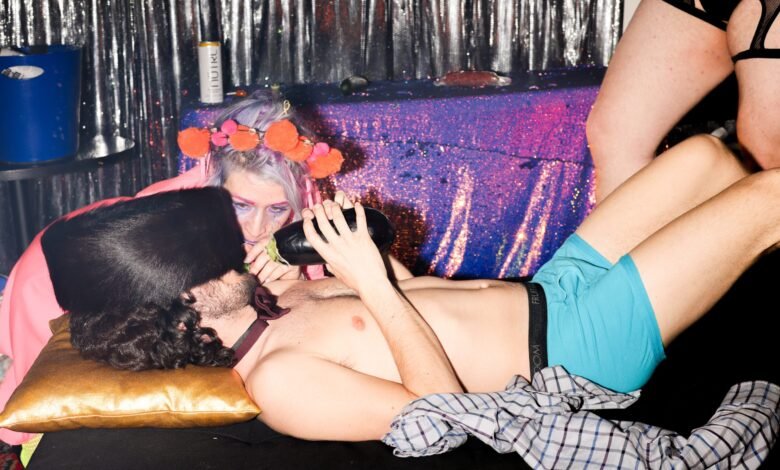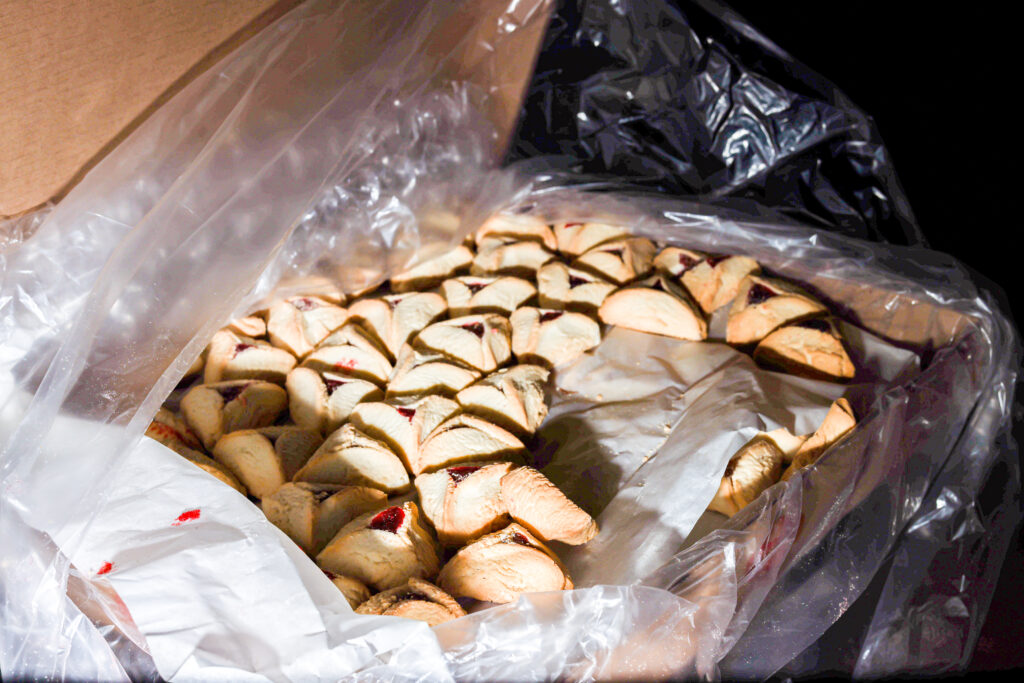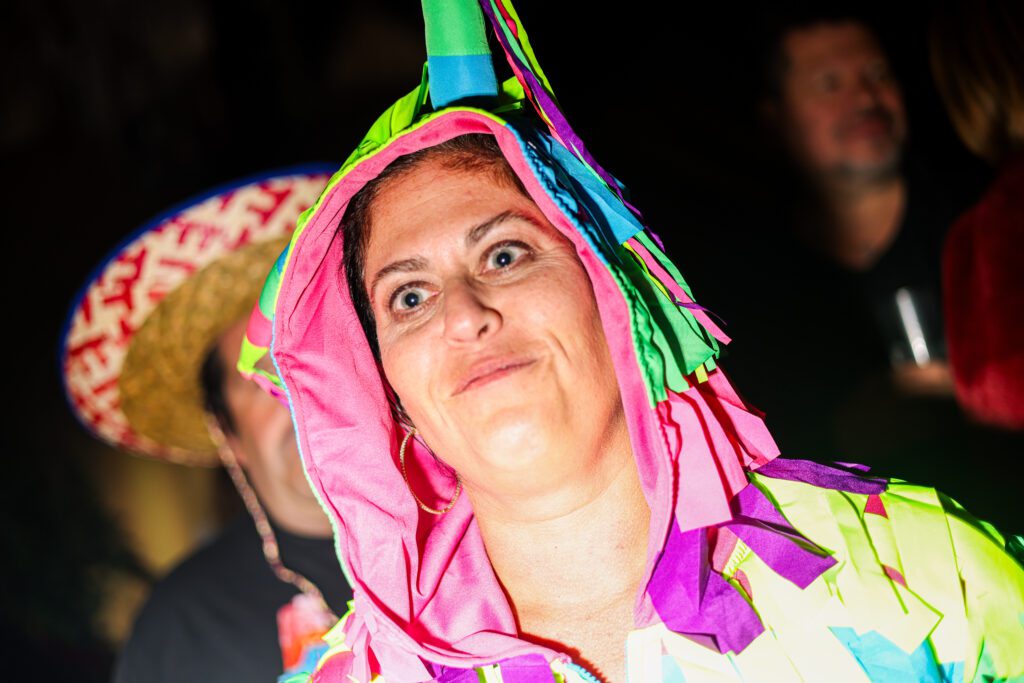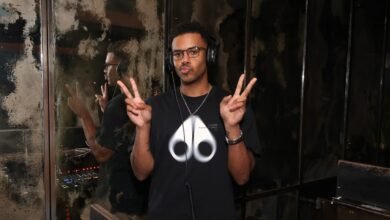‘Burning Man for Orthodox Jews’: Scenes from the raucous Purim party at House of Yes


“Who wants to be circumcised?” shouts performance artist Zoe Nightingale, dressed in a neon fishnet jumpsuit and a shtreimel — a traditional fur hat worn by some Ashkenazi Jewish men.
The partygoers hesitate, squeamish, until eventually, a bold volunteer, dressed as the Greek god Poseidon, clambers onto the stage. He’s ushered onto a low table by a team of performers, who urge him to lie down, and, if he wants to, pull down his pants.
“Do you want to do a blessing for your body?” Asks another performer, wearing a massive dildo and clutching a severed knife. “Is there a part of your body that’s holding you back?”
Then, in a moment of Sweeney-Todd-esque body horror, the trembling participant is handed a salami, only to have the tip of their sausage sliced, snipped and thrown into the air. (No actual circumcisions took place.)

Hold the salami: A guest receives a mock bris (Photo by Arielle Domb)
“I’ve never seen a circumcision like that,” beams Yehuda Krupa, dressed in a red cloak and serpent-headed staff. Despite coming from an Orthodox background, Krupa approves of the absurd spectacle, imitating a brit milah — the Jewish circumcision ceremony. Purim is “where we get shitfaced,” he explains. “The point of this is to drink so much that you can no longer remember who’s good and who’s evil.”

Raucous celebrating and fancy dress are encouraged (Photo by Arielle Domb)
Located in the marquee-like ONYX Room at House of Yes, resident DJ David Kiss’ Purim party, now in its fifth year, feels like an off-kilter Bar Mitzvah fever dream — with its smoke-machines, sequin table-clothes and tipsy moms and dads. It’s one of a number of Purim events launched in New York City in recent years that have embraced alternative traditions, alongside queer, gender-bending parties such as “Flaminggg” and Vashti ball.
Growing up in an ultra-orthodox community, Kiss, who is non-binary, was always drawn to the festivities around Purim. Deriving from the Megillah — a Biblical scroll — the story goes that Queen Esther helped save the Jews of the Persian Empire by revealing to the King that she was Jewish too (“a quintessential coming-out story,” as Idit Klein, president and CEO of Keshet, the Jewish LGBTQ+ advocacy group, has put it).

The Megillah is read aloud on three occasions throughout the night (Photo by Arielle Domb)
“In an orthodox Jewish neighborhood, you’ll see everyone getting really dressed up,” Kiss says, “No one would look twice at someone in drag on that holiday.”
While growing up in that community could feel claustrophobic, Purim was a day that felt free, says Kiss. “It’s kind of like Burning Man for Orthodox Jews,” they say. “It’s always been great seeing people just jump out of their own skin and be a different person, maybe the person they would want to be.”

Non-Jews, non-religious Jews and uOrthodox Jews alike join the party (Photo by Arielle Domb)
Kiss has actually been throwing Purim parties in New York City for 20 years, kicking off at the nightclub Sutra, the Lower East Side venue owned by former nightlife mayor, Ariel Palitz. “The parties that I throw are irreverent,” they say, “but they’re still coming from a place of: I really care about this holiday and I care about our community.”
Tonight, Kiss is DJing alongside their brother, Superkiss, and Sensay Shnay (who also grew up in an ultra-Orthodox community), blending blaring techno tracks with traditional Hasidic music. The party has attracted a diverse crowd: non-Jews, non-religious Jews and ultra-Orthodox Jews alike. Someone might be “dressed as an Orthodox Jew” or “dressed in drag or wearing a dinosaur head,” Kiss says; neither are more or less welcome.

Spider-Mensch? (Photo by Arielle Domb)
Purim is usually the most joyous of all the Jewish holidays, however, the Israel-Gaza war brings a new focus to the party. Kiss is donating $500 of the proceeds raised to Standing Together, an organization of Jews and Palestinians who are fighting for peace in the Middle East.
“The holiday is centered on the themes of persecution and resilience,” they said, a few days before the party, “I hope that everybody who attends will keep that in their minds and be a little bit intentional about how they’re celebrating.”
By midnight, the room has filled up with an assortment of zany costumes. Giant cookies. Bars of soap. Mario and Luigi. Feet. (“Oooooh, it’s Halloween for Jews!” one confused onlooker shouts).
Guests spray crumbs of hamantaschen — triangular shaped pastries oozing with jam — as they get down on the dancefloor. A megillah is carried through the crowd, past a harem of couples snogging on the sofa, and is read aloud on three occasions throughout the night.

Hamantaschen on the dancefloor (Photo by Arielle Domb)
“House of Yes is one place, I’ll be honest, where I can walk up to anybody and talk to them,” says Jen K, who practices Judaism and is dressed as a pinata (her husband, standing beside her, is wearing a sombrero). Going out clubbing isn’t her usual scene, but once a year, she makes her husband a promise: “On Purim we come.”

Jen K, dressed as a pinata (Photo by Arielle Domb)
Combining tradition and transgression, Kiss’ phantasmagoria encourages guests to step outside their comfort zone, to reinvent ancient traditions, occupy identities and realities outside their daily lives. “People were really grateful for it,” says Nightingale, who had run the brit milah ritual. “A lot of the people that laid down with us had never taken their pants off ever before in public.”
After the party, I ask Kiss whether they saw the “intentional” partying that they hoped to create. The evening had seen people from all walks of life, Kiss reflects — letting loose, letting go, moving together.
“That’s where it felt like it was encapsulated,” they say. “Just people dancing.”
The post ‘Burning Man for Orthodox Jews’: Scenes from the raucous Purim party at House of Yes appeared first on Brooklyn Magazine.




